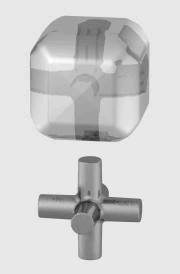
Photo from wikipedia
In this paper we present a new Combinatorial Design based Key Pre-Distribution scheme (CD-KPD). For the scheme, the network region is divided into cells of equal size and each cell… Click to show full abstract
In this paper we present a new Combinatorial Design based Key Pre-Distribution scheme (CD-KPD). For the scheme, the network region is divided into cells of equal size and each cell has two types of sensor nodes namely, normal sensor nodes and cluster heads. Within a particular cell, normal sensor nodes can communicate with each other directly and cluster heads are used for inter-cell communication. To ensure secure communication we use CD-KPD to assign keys to all the sensor nodes including cluster heads. We further modify CD-KPD to propose Combinatorial Design based Reduced Key Pre-Distribution scheme (CD-RKPD) by reducing the number of keys stored in each cluster head. The CD-RKPD was need of the hour when we consider to limit the inter-cell communication of each cell within its Lee sphere region. We give in-detail analysis of both the proposed schemes. We measure the resiliency of both proposed schemes by calculating fraction of links disrupted and fraction of cells disconnected when few sensor nodes are compromised in the network. We found that CD-KPD and CD-RKPD outperforms (Ruj and Roy in ACM Trans Sens Netw 6(1):4, 2009) by 59 and 6.5% respectively in terms of Global Resiliency and 5 and 9.7% respectively in terms of fraction of cell disconnected in the network. Further, we found that both our proposed schemes achieves high resiliency than majority of existing schemes.
Journal Title: Journal of Ambient Intelligence and Humanized Computing
Year Published: 2019
Link to full text (if available)
Share on Social Media: Sign Up to like & get
recommendations!